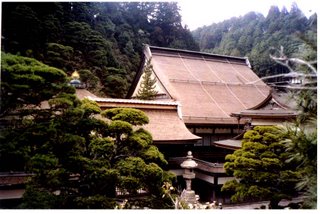|
 Secure Site
Secure Site
|
 |
Archive for April, 2010
 stillness Water gardens, also known as aquatic gardens, backyard ponds and garden ponds, usually referring to a man-made feature, typically combine a pool with aquatic plants and often ornamental fish. Fixed items such as rocks, fountains, statuary, waterfalls and watercourses can be combined with the pool to add visual interest and integration with the local landscape and environment.
Water gardens are a perfect place for a mindfulness practice.
adapted from wikipedia.org
 Bamboo Zen Chime Clock
Now & Zen
1638 Pearl St.
Boulder, CO 80302
Posted in Chime Alarm Clocks, Japanese Inspired Zen Clocks, Meditation Timers, Meditation Tools, Progressive Awakening, Well-being, Zen Timers
 Maneki Neko on Peter's kimono at Ten Thousand Waves Spa, Santa Fe, NM The Maneki Neko (“Beckoning Cat”; also known as Welcoming Cat, Lucky Cat, Money Cat, or Fortune Cat) is a common Japanese sculpture, often made of ceramic, which is believed to bring good luck to the owner. The sculpture depicts a cat (traditionally a Japanese Bobtail) beckoning with an upright paw, and is usually displayed—many times at the entrance—in shops, restaurants, and other businesses. Some of the sculptures are electric or battery-powered and have a slow-moving paw beckoning. I n the design of the sculptures, a raised right paw supposedly attracts money, while a raised left paw attracts customers.
To Westerners it may seem as if the Maneki Neko is waving rather than beckoning. This is due to the difference in gestures and body language recognized by Westerners and the Japanese, with Japanese beckoning by holding up the hand, palm out, and repeatedly folding the fingers down and back up, thus the cat’s appearance.
While it is believed that Maneki Neko first appeared during the later part of the Edo period (1603-1867) in Japan the earliest documentary evidence comes from the 1870s, during Japan’s Meiji Era. It is mentioned in a newspaper article in 1876 and there is evidence kimono-clad Maneki Neko were distributed at a shrine in Osaka during this time.
 Black Lacquer Zen Alarm Clock adapted from wikipedia.org
Now & Zen
1638 Pearl Street
Boulder, CO 80302
Posted in Chime Alarm Clocks, Japanese Inspired Zen Clocks, Now & Zen Alarm Clocks, Progressive Awakening, Zen Timers
 Koya-san, Japan Mount Kōya (Kōya-san) is the name of mountains in Wakayama prefecture to the south of Osaka. There is no one mountain officially called Kōya-san in Japan.
First settled in 819 by the monk Kukai, Mt. Koya is primarily known as the world headquarters of the Koyasan Shingon sect of Japanese Buddhism. Located in an 800 m high valley amid the eight peaks of the mountain (which was the reason this location was selected, in that the terrain is supposed to resemble a lotus plant), the original monastery has grown into the town of Koya, featuring a university dedicated to religious studies and 120 temples, many of which offer lodging to pilgrims.
adapted from wikipedia.org
 Digital Zen Alarm Clock Now & Zen
1638 Pearl St.
Boulder, CO
Posted in Chime Alarm Clocks, Japanese Inspired Zen Clocks, Meditation Timers, Meditation Tools, Now & Zen Alarm Clocks, Zen Gardens, zen monks, Zen Timers
 Hokusai Ukiyo-e Print, Umegawa in Sagami Province Mount Fuji (Fuji-san) is the highest mountain in Japan at 12,388 ft. Along with Mount Tate and Mount Haku, it is one of Japan’s “Three Holy Mountains”. An active volcano that last erupted in 1707–08, Mount Fuji is just west of Tokyo, and can be seen on a clear day. Mount Fuji’s exceptionally symmetrical cone is a well-known symbol of Japan and it is frequently depicted in art and photographs, as well as visited by sightseers and climbers.
While Hokusai’s Thirty-six Views of Mount Fuji is the most famous ukiyo-e series to focus on Mount Fuji, there are several other series with the same subject, including Hiroshige’s Thirty-six Views of Mount Fuji and Hokusai’s own later series One Hundred Views of Mount Fuji.
adapted from wikipedia.org
 Zen Clocks by Now & Zen
Now & Zen
1638 Pearl Street
Boulder, CO 80302
(800) 779-6383
Posted in Chime Alarm Clocks, Meditation Timers, Meditation Tools, Now & Zen Alarm Clocks, Zen Timers
 Dialectical Idealism- stillness Upaya is a term in Mahayana Buddhism which refers to something which goes or brings you up to something (i.e., a goal). It is essentially the Buddhist term for dialectics.
Dialectical Idealism adapted from Wikipedia.org
 Meditation Clock Timer- Bamboo Zen Clock and Timers
Now & Zen
1638 Pearl Street
Boulder, CO 80302
Posted in Japanese Inspired Zen Clocks, Well-being, Zen Timers
 Buddhist Loving Kindness Buddhist loving kindness Mettā or maitrī (sanskrit) has been translated as loving-kindness, friendliness, benevolence, amity, friendship, good will, kindness, love, sympathy, and active interest in others.
It is one of the ten paramitas of the Theravada school of Buddhism, and the first of the four Brahmaviharas. The mettā bhāvanā (“cultivation of mettā”) is a popular form of meditation in Buddhism.
“Loving-kindness” is a term first used in the 1535 Coverdale Bible. The idea is associated with the Christian concept of agape, or love of God, which is reflected in the quote:
“God is inherently kind, naturally compassionate, and everlastingly merciful. And never is it necessary that any influence be brought to bear upon the Father to call forth his loving-kindness.”
Beyond Christianity, English translations of the writings of the Bahá’í Faith also use the term “loving-kindness” when referring to the original Persian “mohabbat”.
Buddhist Loving Kindness adapted from wikipedia.org
Posted in Chime Alarm Clocks, Meditation Timers, Meditation Tools, mindfulness practice, Natural Awakening, Now & Zen Alarm Clocks, prayer, Progressive Awakening, Well-being, Yoga Timer, Yoga Timers by Now & Zen, Zen Timers
« Previous Page
Next Entries »
|
|
|
|